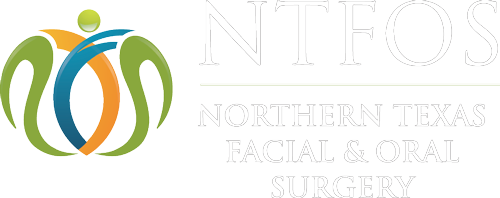How Does Jaw Surgery Treat Sleep Apnea in North Texas?
Sleep apnea is a condition that impacts your breathing, your sleep quality, and your life. Patients with sleep apnea experience irregular breathing while they sleep, resulting in health issues such as fatigue, weight gain, memory loss, cardiovascular problems, and more. In many cases, continuous positive airway pressure (CPAP) provides effective relief of symptoms. For some patients with obstructive sleep apnea, however, CPAP is ineffective, and other treatments and corrective devices do not relieve symptoms.
Fortunately, medical advancements have made jaw surgery a safe and effective way to alleviate sleep apnea symptoms permanently. The team at Northern Texas Facial & Oral Surgery is here to explain how jaw surgery is a viable solution for certain patients suffering from obstructive sleep apnea. Contact us today for an appointment in North Texas.
How does jaw surgery work?
Obstructive sleep apnea is the result of an airway blockage caused by soft tissue that collapses and closes in the back of the throat. Most often used if the jaws are set back, jaw surgery to treat obstructive sleep apnea moves the jaws forward to correct the obstructed airway and throat. Once the airway is cleared, patients can achieve restful sleep and breathe easier. Corrective jaw surgery also moves the tongue forward and enlarges the palate area, which promotes breathing and helps prevent snoring.
Depending on the placement of the patient’s jaw, the upper jaw (maxilla) or lower jaw (mandible) are moved in a procedure called maxillomandibular advancement. If both the upper and lower jaws are moved forward, the surgery is called a bimaxillary advancement.
Who is a candidate for jaw surgery?
You may be a viable candidate for jaw surgery to correct obstructive sleep apnea if you:
- Have a setback jaw, such as occurs with micrognathia or retrognathia
- Do not have abnormalities in the upper or lower jaw
- Are less than 50 years of age
- Don’t experience improvement of sleep apnea symptoms after continuous positive airway pressure (CPAP), with the usage of a mandibular advancement device, or other procedures
- Have a BMI of less than 30
It’s important to consult with an experienced surgeon to learn if jaw surgery is right for you. Because maxillomandibular advancement and bimaxillary advancement are complex procedures, it’s recommended to find an oral surgeon who is skilled in maxillofacial surgery.
What does recovery for jaw surgery look like?
After your surgery, your oral surgeon will give you detailed instructions for post-operative care. In general, it takes two to three months to recover fully from the surgery. The first six weeks of recovery require a soft diet to ensure proper healing. In most cases, rubber bands and braces will be placed around your teeth to provide additional stability and to help with the recovery process. You can manage pain and swelling with ice and standard acetaminophens like Tylenol. Stronger pain medication can be prescribed as well, and you’ll take antibiotics to combat any potential infection.
If care is taken, as with any surgery, recovery is fairly straightforward. Complications for this procedure are rare and usually reversible if they do occur.
What are the benefits of the surgery?
There are many benefits to corrective jaw surgery for obstructive sleep apnea. Some of the benefits of jaw surgery include:
- Permanent or long-lasting relief from obstructive sleep apnea: Better and more restful sleep means decreased health problems and improved overall health. Correcting your sleep apnea means you have a lower risk of experiencing obesity, heart disease, high blood pressure, infertility, depression, and more that result from sleep apnea.
- Less painful than other corrective oral surgical procedures: Because of naturally occurring numbness that results from jaw surgery, maxillomandibular or bimaxillary advancement is less painful than smaller, less invasive surgeries like isolated soft palate surgery. Any numbness that occurs as a side effect of the surgery is temporary in more than 85% of patients.
- No more awkward or uncomfortable devices: Since jaw surgery corrects your jaw to expand your airway, the need for medical and oral devices to treat your sleep apnea is removed.
Will my appearance and bite change?
Because maxillomandibular or bimaxillary advancement adjusts the position of your jaw, your appearance will change slightly. The changes are not unpleasant, however, and over 90% of patients are pleased with their post-surgery appearance. The shifted jaw tends to result in a more youthful appearance by creating a more symmetric, “stronger” profile and tightening fine lines and wrinkles.
As for bite, since the jaws and tongue are only moved forward, your bite will likely stay the same.
An effective solution
Corrective jaw surgery for obstructive sleep apnea provides instant relief of sleep apnea symptoms in viable candidates of the procedure. The procedure has a minimal risk of complications, is less painful than other procedures, and creates more space for breathing. Plus, this medical procedure only results in a minimal change to your appearance and will not change your bite pattern. Correcting your sleep apnea will help you improve your mental, physical, and emotional well-being. Consult with one of the skilled oral surgeons at Northern Texas Facial & Oral Surgery in North Texas today to learn if you’re a candidate for a maxillomandibular or bimaxillary advancement. Let us help you rest better and reclaim your life.
